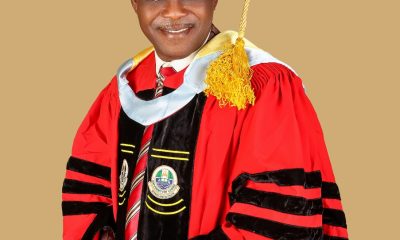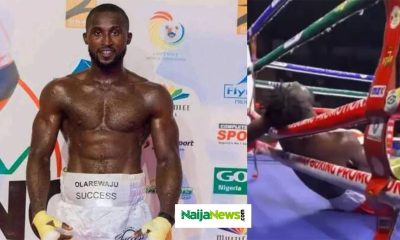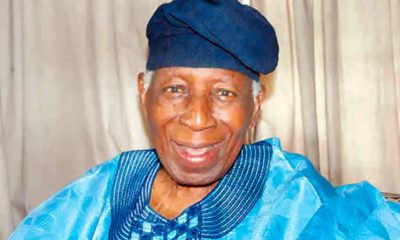Opinion
Opinion: Corps Marshal Boboye Oyeyemi, last man standing, bows out gracefully

By ACM Bisi Kazeem, fsi
When he was appointed as the first internally groomed Corps Marshal of the Federal Road Safety Corps (FRSC) by former President Goodluck Jonathan on 23rd July 2014, the emergence of Dr Boboye Olayemi Oyeyemi was celebrated widely not only among the staff of the Corps, but stakeholders and members of the public who were conscious of development within the Corps. The wide jubilation that heralded his appointment was borne out of the long expectations of the people that a competent officer with full understanding of the vision and mission of the organization got the opportunity to manage the elite Corps that had earlier earned public trust and got certified with the global certificate of standardisation, otherwise referred to as ISO 9001:2008 for sustained improvement.
Prior to his appointment, Oyeyemi who was one of the few founding officers of the Corps had gained wide ranging experiences spanning all the major departments and commands of the Corps, all of which he excelled in managing without blame. With his robust background in operations, motor vehicle administration, training and policy, research and statistics, which he managed with excellence, all eyes were on the Federal Government to give him the opportunity to showcase the leadership skills he had learnt over the years under successive Corps Marshals.
His emergence was, therefore, not surprising to all those interested in the growth and development of the Corps. Interestingly, he did not disappoint the people as he hit the ground running after his swearing in by the former secretary to the Government of the Federation, Senator Anyim Pius Anyim in the conference hall of the SGF office. An advocate of policy continuity, Oyeyemi had no difficulty in recognising the need to uphold and build on the policy direction taken by his predecessor, Chief Osita Chidoka who had earlier been appointed as a minister and member of the Federal Executive Council.
He announced his management ideals during his maiden strategy session with the principal officers of the National Headquarters and Zonal Commanding Officers when he stated that the principles of his management would be anchored on the tripod of Consultation, Reward and Punishment ( CRP) an acronym for the use of carrots and sticks in managing the affairs of the Corps. As a versatile computer user, Oyeyemi not only promoted the digitization policy of the Corps, but took it to the next level thereby widening the scope, usage and accessibility of computers among the generality of the Corps in the last 8 years that he was saddled with the responsibility of leading the organization.
Having successfully spent his two tenures at the topmost office of the Corps and is graciously bowing out, the questions on the lips of many anxious Nigerians are, what did he do differently that he could be remembered for by the coming generations? Here, we must point out first and foremost that the unprecedented levels of recruitment that he secured from the Federal Government within the years has, no doubt, raised the number of qualified personnel available to carryout specialist and general duty assignments that have significantly improved the presence and visibility of the Corps across the nation’s highways. His policy of ensuring effective management of the wide network of road nationwide has led to the Introduction of Corridor Commands and Station Offices which has made the presence of the FRSC in all the nation’s 774 local governments possible for collective ownership of traffic management as envisaged by the Road Safety Strategy initiative.
Concerned with the poor office accomodation and dilapidated nature of most of the structures occupied by the Corps on rent basis across the ststes, Oyeyemi-led Management vigorously pursued the policy of constructing permanent office accomodation most of which have been commissioned across states in the six geopolitical zones of the country. This has created opportunity for modern and permanent office structures owned by the Corps.
Towards ensuring a happier and more productive post service life for staff, the last man standing unveiled project 20,000 staff Housing Scheme to make house ownership easier for all staff of the Corps while we brought into existence FRSC Post-Service Scheme (PSS) to help members of the Corps save for retirement before the retirement benefit/pension are paid.
Furthermore, the aggressive pursuit of the policy of fleet renewal by his Management has led to the procurement of unprecedented number of operational vehicles, tow trucks, ambulances, administration vehicles and other rescue equipment, the largest ever secured by any management in the 34 years of the Coros’ existence.
As an organization built on the ingredients of knowledge, the FRSC Management under Oyeyemi paid special attention to staff capacity development programmes through which opportunities for local and foreign trainings were offered to all cadres of staff. Further to this, the various institutions of learning aimed at developing the intellectual and road traffic management expertise of the Corps were not only established, but some upgraded to make it possible for them to offer advanced knowledge and certification. To this end, the FRSC Academy Udi, Enugu State was upgraded as centre of excellence for study of road safety and affiliated with the Federal University of Technology, Owerri for the award of post-graduate degree programs in transportation Management.
His Management has been able to successfully negotiate and took delivery of an ultra-modern Inspectorate Training School, Owa Alero in Delta State through the benevolence of the government and people of Delta State. 8n addition, he has been able to negotiate and secured the agreement of Plateau State Government to build the Road Marshal Assistant Training School in Shendam, Plateau State, where work is already at an advanced stage. And in his commitment to career development of staff which aligns with the policy of rewarding excellence, the yearly promotion exercise has continued to be observed in the last 8 years of his management thereby creating opportunity for upward movement of the staff in line with available vacancies and strict adherence to the provisions of the federal character principles.
More to the above, Oyeyemi developed transformational initiatives focused on People, Processes and Technology (PPT) that is why today not only does its staff pride as the most disciplined but the Corps stands as the best Information Technology (IT) driven organization in Nigeria with its robust data base and over 95 percentage digitalized administrative and operational procedures.
His administrative ingenuity that led to the deployment of FRSC personnel to Tank Farms has to a large degree, dwindled the rate of crashes associated with articulated vehicles, particularly tankers carrying petroleum products. Through its Safe-to- Load initiative, articulated vehicle have been subjected to checks before they are allowed to load from the various depots across the country with trained personnel of the Corps undertaken routine checks to ensure strict compliance.
Meanwhile, the need for constant education and enlightenment of road users and members of the public on road safety matters as well as conditions of the roads as they move out everyday, led to the establishment of the National Traffic Radio (107.1 FM) Abuja. In the same way, the quest for improved service delivery in the licensing system of the country has led to the establishment of additional Print Farms in the country, while his Management has given impetus to the operational performance of the Corps through the establishment of the operations monitoring and Control Center, procurement and deployment of Body Cameras and establishment of Drivers Proficiency Center at Inspectors Training School, Owa Alero in conjunction with the Delta State Government.
The Corps under his watch, has successfully strengthened inter-agency cooperation with relevant stakeholders such as the National Identity Management Commission (NIMC), National Bureau of Statistics (NBS), Nigerian Customs Service (NCS), all Military and Paramilitary organisations and Banks in Nigeria with evident success in inter agency collaboration and harmonization of data for national development.
Again, it is noteworthy to look at the direction of his leadership’s swift response to the incessant abuse of traffic rules which led to the putting together of the OPERATION COBRA to address certain life-threatening and traffic-related offences. Offenders arrested by the Operation Cobra squad are usually referred to a government health facility for Emotional Stability Test. This step has entrenched compliance and safe road use within the operational areas where the Cobra squad operate.
The subsequent introduction of the body camera by patrol teams will no doubt increase the desire for transparency and evidence based operations that could enhance public trust in the Corps. This will not assist in curbing violence and illegal transaction by personnel while on the highway but will lend credence to the anti-corruption stance of the Corps.
The feat achieved by the FRSC in the last 8 years of Oyeyemi management has led to various local and international recognition and awards that have placed Nigeria’s FRSC as the best example of a road safety lead agency which other governments in developing societies are encouraged to emulate by replicating it in their countries. And with more investments through increased budgetary allocation as well as private sector intervention under the Corps’ partnership initiative and drives, there’s high expectation that the message of road safety will reach great number of people and would impact more on the driving culture of the people towards the envisaged attainment of the goals of safer road environment in the country.
Nigerians that are conscious about the positive developments that have taken place in the Corps in the last 8 years under Oyeyemi-led Management are no doubt convinced that that FRSC has reached a point where its capacity would be able to satisfactorily tackle the challenges of traffic management and safety administration in the country, such that road traffic crashes would not necessarily lead to death.
And as he bows out gracefully after a successful sojourn in the FRSC as the last founding officers that has seen the growth and development of the Corps in the last 34 years 8 out of which he spent as its head, the common refrain is that, Dr Boboye Oyeyemi maybe retiring, but he should not be tired of rendering his services to the nation in whatever areas his expertise could be demanded, even in retirement. By so doing, the nation would stand to continue to derive from his wealth of experience in tackling some of the socioeconomic and security challenges bedvilling this nation and truncating its march to development.

- Assistant Corps Marshal Kazeem is the Corps Public Education Officer of the FRSC.
Opinion
Tinubu, Atiku, and Argentina: United by pain, divided by rhetoric, By Farooq Kperogi

Tinubu, Atiku, and Argentina: United by pain, divided by rhetoric, By Farooq Kperogi
President Bola Tinubu’s Senior Special Assistant on Social Media by the name of Dada Olusegun reportedly said on Thursday that had Nigerians elected former Vice President Atiku Abubakar as president, they would have been sweltering in the same snake pit of torment and economic decline as Argentinians are.
Olusegun’s comment was informed by Atiku’s previous praise for Argentinian President Javier Milei’s economic reforms on February 25, 2024, when Atiku had encouraged Tinubu to emulate the Argentine model.
“Reports have shown how Argentina’s real economy which Alhaji Atiku wants Nigeria to emulate is in severe crisis,” he was quoted to have written on Twitter. “Public debts have reached new highs with the country owing more to the IMF than any other country in the world. Meanwhile, its education sector, manufacturing and construction are collapsing amid rapid deindustrialization. Argentina has $41 billion in credit outstanding, representing 28% of all debt owed to the Fund.”
It’s interesting that the presidential aide painted a dystopian vision of Nigeria’s fate under an Atiku Abubakar presidency by invoking the existential turmoil gripping Argentina under Javier Milei. Yet, delicious irony hums beneath the surface, unseen by Olusegun. President Tinubu’s own economic prescriptions mirror Milei’s policies so closely they might as well be fraternal twins.
Both Tinubu and Milei are champions of punishing austerity. Both are architects of spiraling inflation and social distress. But as the presidential aide warned Nigerians against the imagined peril of emulating Argentina, he entirely missed the reflection staring back from his own political mirror.
He seems blissfully unaware that his cautionary tale is already Nigeria’s lived reality, which is dramatized in the daily hardships and grievances of citizens enduring a spectacle not different from Milei’s Argentina.
In my March 9, 2024, column titled “Rise of Right-wing Economic Populism in Nigeria,” where I tackled Atiku for prescribing Argentina as a model for Nigeria,’ I wrote the following, which is still relevant today:
“Everyone within striking distance of becoming president in Nigeria in 2023 subscribed—and still subscribes—to the consensus that the IMF and the World Bank are inviolable economic oracles that must not be disobeyed, that subsidies must be eliminated and the poor be left to fend for themselves, and that the market is supreme and should be left to determine the value of everything.
READ ALSO:
- Chinese man found with fake diplomatic number plate in Lagos
- Akpabio to sue Natasha for alleged assassination attempt
- Oyo PDP chieftain Adeojo dies, Makinde mourns
“In fact, the other day, PDP presidential candidate Atiku Abubakar put out a press statement titled ‘Argentina’s Javier Milei approach to reforms should serve as a lesson for Tinubu’ where he extolled the dangerously right-wing Argentinian president Javier Milei whose rightwing economic populist policies are destroying the fabric of his country.
“‘I read a recent report in Reuters titled: “Argentina’s market double down on Milei as investors ‘start to believe”,’ he wrote.
“Well, the same Western financial establishment is already praising the outcome of Tinubu’s economic policies. A March 8, 2024, report from Bloomberg, for instance, has said that ‘Foreign investor demand for Nigerian assets surges as reforms instituted by President Bola Tinubu’s administration starts paying off.’
“Similarly, one David Roberts, identified as a former British Council Director in Abuja, bragged the other day that Nigeria’s economy ‘posted a GDP growth of 3.46% in quarter 4’ as a result of Tinubu’s economic reforms.
“He wrote: ‘Why would a country with a severe infrastructural deficit invest more money on a wasteful expenditure such as cheap petrol, instead of building schools, hospitals, dams and a national railway system? It is evident that it had to go.
‘We joined the World Bank and the International Monetary Fund in saying as much to the Nigerian government. And at long last, it is gone.’
“People outside Nigeria reading about Nigeria in the Western financial press would think Nigerians are now living in El- Dorado as a result of Tinubu’s ‘reforms’—just like Atiku thinks a favorable Reuters story about the anti-people economic policies of Milei, who is called the ‘Madman of Argentina,’ is already yielding excellent outcomes.
“If you do the bidding of the Western establishment, they will always make up statistics to show that your economy has grown. I called attention to this in my June 28, 2023, column titled, ‘Why Tinubu’s Hiring and Firing Frenzy Excites Nigerians.
“I wrote: ‘What shall it profit a country when it pursues policies that cause the economy to ‘grow’ but cause the people to growl? After the economy has ‘grown’ but the people still groan, where is the growth? The most important growth isn’t the rise in abstract, disembodied, World Bank/IMF-created metrics but in the improvement of the quality of life of everyday folks.’
“Milei’s Argentina that Atiku is praising is almost in the same right-wing economic hellscape as Nigeria is. Like Tinubu, Milei began his presidency by removing subsidies for petrol and transportation and devaluing the Argentinian peso by more than 50 percent. In addition, he threw scores of workers into unemployment when he reduced the number of ministries in the country.
READ ALSO:
- Bayelsa govt gets court order to stop pro-Wike rally
- Outgone Corps members will get minimum allowance arrears – NYSC
- Natasha dares Akpabio to sue her for exposing assassination plot
“He is so market-centric he scrapped a whole host of rules designed to reign in the greed and exploitation of private enterprises. He did this by getting the parliament to approve the principle of ‘delegated powers’ to the executive for one year, which allows him to rule by decree like a military dictator in the name of ‘economic urgency.’
“The result? Like in Nigeria, most Argentinians are having a hard time finding food to eat. A February 1, 2024, CNN story captures it: “‘I don’t know how I will eat.’ For the workers behind Argentina’s national drink, Milei’s reforms are turning sour.”
“Argentinian workers periodically go on strike to protest Milei’s punishing right-wing policies. On February 28, all flights were cancelled in the country because air travel workers went on a crippling 24-hour strike.
“A March 4, 2024, Bloomberg report said Milei’s policies had caused spending to plunge at shops in Argentina, that firms were seeing double-digit sales declines for third straight month, that the worth of salaries had plummeted amid a paralyzing 250% inflation, and that recession was deepening in the country.
“The lead to the story says it all: ‘Consumers in Argentina are running out of options to shield themselves from runaway price increases as President Javier Milei’s austerity measures send the country deeper into recession.’
“That’s Atiku’s exemplar for Nigeria. Peter Obi is, of course, no different. Tinubu, Atiku, Obi, and in fact Yemi Osinbajo are united in their love for rightwing economics, which invariably leads to an increase in poverty, suffocation of workers, rolling back of welfare for common people, etc.
“In a perverse way, they are actually worse than Buhari because they are self-conscious conservative economic ideologues. Buhari is merely a know-nothing, bungling, kakistocratic power monger.
READ ALSO:
- Fraud rocks FIRS, court orders final forfeiture of Abuja, Kano houses linked to official
- Your time is almost up, military tells notorious bandit leader Turji
- Police recover body of Delta site engineer killed, buried by employees
“The real tragedy is that the vast majority of Nigerians who are ensconced in the narrow ethno-religious political silos built around the personalities of the major 2023 presidential candidates don’t realize that on economic policies, which is what really matters, Tinubu, Atiku, Obi, and Osinbajo are more alike than unlike.
“Sadly, Nigerian leftists, who used to be the bulwark against the dangers of conservative economic totalitarianism, have either been coopted or silenced. Only Femi Falana, Majeed Dahiru, I, and a few others consistently stand up to the forces of economic conservatism.
“This state of affairs will ensure that Tinubu’s successor will be another neoliberal ideologue who will bludgeon his way to the presidency using religion and ethnicity as cudgels. When he deepens the misery he inherits, he will blame his predecessor for not being a faithful practitioner of the neoliberal gospel. His own successor will replicate his template.
“After three terms of this right-wing baloney, Nigeria will be irretrievably gone. The time to pivot from the IMF and the World Bank and to reject everyone who is their poodle is now.”
Because Tinubu’s presidential aide is shielded from the biting aftermath of his principal’s cruel economic policies, he imagines that Nigeria is different from Argentina. He is deluded. He lives in an alternate, sequestered reality.
Just as Tinubu’s swift removal of petrol subsidy and his devaluation of the naira set off inflationary shockwaves that hit millions of households in Nigeria, Milei’s shock therapy, which also involves subsidy cuts, currency plunge, and fiscal austerity, has exacerbated hyperinflation and unemployment, caused more than half the population to teeter below the poverty line, and provoked social unrest.
In both Nigeria and Argentina, the middle class has been squeezed: many who were managing to live decent lives have slid backwards because soaring prices and job losses, undermining the very social fabric needed for a stable economy. Tinubu’s Nigeria and Milei’s Argentina present a distinction without a difference.
Tinubu, Atiku, and Argentina: United by pain, divided by rhetoric, By Farooq Kperogi
Farooq Kperogi is a renowned columnist and United States-based Professor of Journalism.
Opinion
How Wande Abimbola rejected IBB’s ING bait, and other stories (3)

How Wande Abimbola rejected IBB’s ING bait, and other stories (3)
Tunde Odesola
(Published in The PUNCH, on Friday, April 4, 2025)
Abimbola’s eyes had seen 999 battles; so, one more battle would not make him go blind. Having survived a milestone of battles, it was natural for Abimbola to deploy his greatest weapon, Ifa, to prosecute the students’ battle that raged during his tenure as vice-chancellor of the University of Ife.
The Babalawo’s eyes had seen many òkun (oceans) and countless òsà (lagoons), so he would not panic at the sight of isún (springs). Wande had fought many wars, yet he remained unbowed, standing on the rock of truth.
In the military years of the 1980s, vice-chancellors of federal universities were statutorily entitled to a first term of four years and, if reappointed, got a three-year second term.
In Abimbola’s seven years of vice-chancellorship (1982-1989), Great Ife witnessed giant strides, such as the purchase of a $1.2bn first-in-Africa accelerator for nuclear research energy and medicine – bought from France in 1986; establishment of 23 linkages with various world-class citadels of knowledge, maintaining peace and tranquility among staff and students, and supporting teaching, research and development.
“The university had a bank account in New York and an office in the UK, manned by whites. When an official of the university visited a university in the UK or our students went for exchange programmes, they– white officials employed by Ife– were the ones who saw to protocols, arranging for hotels, etc. It was a liaison office where those inquiring about our university could go and make inquiries. We had lots of money in the university’s accounts in the UK and New York City.
“But, in line with a Federal Government directive that later emerged and forbade public institutions from running foreign accounts, Education Minister, Prof Jubril Aminu, said we should close down the account and all the money in the account was moved through the education ministry to Federal Government’s account in 1986,” Abimbola said.
READ ALSO:
- South African court acquits Nigerian pastor of rape after 8 years in jail
- Man jailed 3 months for non-declaration of $30,000 at airport
- More heads to roll in NNPCL, subsidiaries as Ojulari assumes office
In the same year, an external battle spilled over to Great Ife when Ife students, in solidarity with their Ahmadu Bello University colleagues, planned to embark on a protest called Ango-Must-Go.
Agronomy expert, Prof Ango Abdullahi, was the vice-chancellor of ABU, whom protesting students accused of callousness, following an increase in school fees, among many other allegations. Abdullahi had reportedly invited the police to quell a peaceful protest, an authoritarian action, which some newspapers said resulted in the rape, maiming and killing of students and non-students by the police.
A slew of Western press, including BBC, Voice of America, The Washington Post, Chicago Tribune, etc. reported in 1986 that many lives were lost to the ABU riot, with Nigerian newspapers lamenting, “Abdullahi expressed no regrets inviting the police,” and that he said, “only four people died.”
Currently, Abdullahi is a Commander of the Order of the Niger (CON deleted) and he holds the Magajin Rafin Zazzau traditional title. He is 86 years old.
Abimbola said, “Higher institution students from all over the country had gathered in our university. They wanted to hold the mother of all rallies because some of their colleagues had been killed by the police in ABU, Zaria.
“Security reports showed that the external students were in their thousands and had joined forces with our student population that numbered up to 30,000 because Moore Plantation, Ibadan; Adeyemi College of Education, Ondo; and the Institute of Agriculture, Akure, were part of UNIFE then.
“The students were charging themselves up all through the night, singing, dancing and drinking, preparatory to a grand protest the next morning. The fear of the unknown gripped the university community because nobody could predict what the external students could do, but we know our students were not destructive.
“I consulted Ifa, and Ifa told me what to do. In the middle of the night called óru ògànjó, I did what Ifa told me to do. Subsequently, loud and strange sounds reverberated through the university, sending shivers down the spines of the students who stopped singing and dancing, with the foreign students fleeing the campus as early as 5 a.m., while our students ceased all protest activities and went back to class. I am a lover of freedom of expression and association, but I could not leave the university community at the mercy of the foreign students, who could have wreaked havoc because they did not know the Ife tradition of protest.”
READ ALSO:
- Barcelona beat Atletico to set up cup final against Real Madrid
- NNPCL hikes petrol pump price to N950/litre
- Liverpool leap closer to title with narrow Everton win
So, I asked Awise Agbaye if African traditional bulletproof could stop AK-47 bullets. “No, it cannot,” Abimbola said. Abimbola’s response was in tandem with the answer given by the Araba of Osogbo, Chief Ifayemi Elebuibon, whom I had asked the same question some time ago.
In my article, “Can African bulletproof stop AK-47 bullets?”, published in The PUNCH, on January 18, 2021, a former Military Administrator of Lagos State, Brigadier-General Olagunsoye Oyinlola, said no African traditional bulletproof can stop bullets from AK-47 rifle, a position which pan-Yoruba activist, Sunday Adeyemo, aka Sunday Igboho, opposed, saying he had ‘authentic’ African traditional bulletproof that could stop AK-47 bullets. The Ooni, Oba Adeyeye Ogunwusi, also said in a telephone interview with me that ‘ayeta’ could stop bullets from an AK-47.
However, Oyinlola, who fought in the Chadian crisis of the 1980s and (also deleted) led Nigeria’s contingent to the United Nations’ peacekeeping mission in Somali in the early 1990s, said, “In the dane guns that masqueraders use in deceiving people, it is the gunpowder in them that explodes, they have removed the balls in the guns. As for soldiers missing their target when shooting at armed robbers tied to stakes, you must realise that it is not easy to kill a fellow human being.
“Some of the soldiers are newly recruited. Some shut their eyes and shoot up. There was a time that the officer commanding the shooting had to kick out one of the soldiers because he was closing his eyes and shooting up. If it was ‘ayeta’ that made bullets not penetrate the robbers’ bodies initially, why did they die eventually?”
Despite being armed, Sunday Igboho and some of his men fled when the democratic dictatorship of former President Muhammadu Buhari sent AK47-wielding killers in DSS uniform after him in his Ibadan home at night, following his strident condemnation of the widespread killing of Yoruba farmers by Fulani herdsmen in the South-West. One of Igboho’s men, who had charms all over his body, was killed and his corpse taken away by the killer DSS men.
READ ALSO:
- Protect vulnerable Nigerians, IMF tells Tinubu
- Ex-NYSC DG Tsiga regains freedom after 56 days in captivity
- Notorious bandit leader Bello Turji goes berserk, kills 12 to celebrates Eid
In an interview with me, Abimbola recalled that French soldiers cut off the charmed bracelets, amulets, gourds and cowries that Nigerian volunteers to WW1 had on their bodies.
Recounting how his father enlisted in WW1, Abimbola said, “ My father was playing ‘ayò olópón’ with six others in Oyo when the town crier came and announced the war. From the ayò game, they all voluntarily went to the palace and were enlisted to fight on the side of France in Cameroon between 1914 and 1916. This was when European allied forces were fighting Germany and taking over Germany-colonised territories worldwide during the fallout of WW1. Germany had colonised portions of Cameroon, which France took over during the war.
“The coalition took back all the African territories controlled by Germany. The countries include Tanganyika, now Tanzania, Rwanda/Burundi, Namibia, Cameroon and Togo. When I went to France in 1986 to purchase the accelerator, I told French authorities that my father fought on the side of France during WW1, they collected my father’s name, and the next day, they came and told me it was true, saying I could apply for French citizenship on account of my father’s participation in the war. But I did not.
“It was my grandfather, Akinsilola, nicknamed Légbejúre (fàdá owó è pa ìjàkùmò), who led Oyo warriors to Ijaye, while Ogunmola led Ibadan warriors to Ijaye during the Ijaye War, and both forces levelled Ijaye. The late Alaaafin, Oba Lamidi Adeyemi, used to recite the panegyrics of the Oyo warriors who went to the Ijaye War, affirming my grandfather’s leadership of the Oyo forces. Unfortunately, I did not document the late Alaafin’s account.”
When the Nigerian Civil War broke out, Abimbola’s father and his younger brother, who also fought in WWI, urged Abimbola to enlist for the war.
“I wished to go. But I was writing my PhD thesis then. If I had completed my PhD, maybe I would have gone to the civil war,” he said.
Extolling moderation, humility, contentment and truth as virtues for longevity, Abimbola said he rejected plots of land someone gifted him in Lagos when he was VC, adding that the only house he owned was his father’s house in Oyo, which he remodelled as advised by his father.
Abimbola, who has 17 children, including three sets of twins, revealed that he never attained the only position he struggled to get, which was the governorship of Oyo State.
“1975 was the last time I drove a car. As VC, I had a total of five cooks and stewards, and there were 18 vehicles in the fleet, including a Peugeot 504 and two Mercedes-Benzes. I never rode the Mercedes-Benz because I knew I could not maintain such a lifestyle after my tenure. I only rode the Peugeot. The 18-car fleet was for the operation of our linkages, too,” Awise said.
* Concluded.
Email: tundeodes2003@yahoo.com
Facebook: @Tunde Odesola
X: @Tunde_Odesola
Opinion
Barbaric mass burning of innocents in Edo, by Farooq Kperogi

Barbaric mass burning of innocents in Edo, by Farooq Kperogi
I woke up on Friday morning to a deluge of forwarded, unwatchably terrifying videos showing 16 Hausa hunters, who were traveling from Port Harcourt to Kano for the forthcoming Eid-el-fitr festivities, being lynched and burned alive by a mob of blood-thirsty savages in the town of Uromi in Edo State. I’ve been sick to my stomach.
My inquiry has led me to understand that the Uromi community has been gripped by abductions for ransom, which sometimes result in deaths. Seething with rage and vengeance over the incessancy of deadly kidnapping by “Fulani herdsmen,” the community was primed for jungle justice.
When local vigilantes accosted a bus traveling northward through the town, they found Hausa hunters armed with hunting guns and machetes aboard. In the bigoted, know-nothing estimation of the Uromi vigilantes, Hausa hunters were one and the same as Fulani kidnappers.
So, they burned the innocent Hausa hunters for the crimes of anonymous Fulani bandits. I honestly couldn’t bring myself to watch the dreadfully nightmarish videos to the end.
These sorts of savage slaughters of innocents persist in Nigeria not just because of a progressive loss of faith in formal institutions for the redress of communal grievance, heightened anxieties about safety, and increasing faith in the efficacy of jungle justice but also because of the absence of consequences for them.
As I pointed out when Deborah Yakubu was extrajudicially murdered by a mob of unhinged fanatics in Sokoto in May 2022, there is no greater enabler of jungle justice than a lack of consequence for it.
Sadly, when tragedies like this occur, there is a habitual, safe, standard, prepackaged rhetorical template that people in government effortlessly regurgitate. They promise to bring the perpetrators to justice, make performative arrests to quench public thirst for justice, and nothing else happens. That can’t continue.
When I called for the prosecution and public execution of the murderers of Deborah in 2022, I warned that it was necessary “to serve as an example to other would-be murderers.”
READ ALSO:
- Investigation of wanted businesswoman Achimugu not linked with Atiku, Sanwo-Olu – EFCC
- No Sallah durbar festival in Kano this year – Police warn
- $100m coin collection buried for decade to be auctioned
Of course, Deborah’s murder wasn’t the first example of jungle justice. Harira and her four children were ferociously murdered by maniacal thugs in Anambra State, and nothing was done about it. The list is too long to fit in a newspaper column. But I argued that it’s never too late to do the right thing.
I will repeat my plea. The murderers of these innocent travelers are easily identifiable from the videos that are circulating online. They should all be apprehended, tried, and executed in public to deter a repeat.
But, in the interest of proportionality of justice, this should not be limited to this Uromi incident. All cases of jungle justice should equally be punished the same way. The punishment for murder in both the Criminal Code and the Penal Code is death. The law should be followed.
Another thing that this incident instantiates is the danger of toxic ignorance. Before Muhammadu Buhari became president, all northerners in southern Nigeria used to be “Hausa,” irrespective of their ethnic and religious identities.
After Buhari became president, every northerner, especially if the northerner is also Muslim, became “Fulani,” which led me to write a June 5, 2021, column titled, “‘Fulanization’ of the North by the South.” The South, I wrote, was relentlessly rhetorically Fulanizing the North, particularly the Muslim North, just to fertilize and sustain a simplistic narrative.
This simplistic, misbegotten narrative probably led the Uromi mass murderers to assume that Hausa people with hunting instruments must be Fulani bandits since they have internalized the wrongheaded notion that all northern Muslims are “Fulani.”
Never mind that Hausa and Fulani communities in many northwestern states are at daggers drawn over kidnappings for ransom by Fulani outlaws, or that more northerners are kidnapped for ransom than people anywhere else in the country.
Trust TV, the broadcast arm of Daily Trust, did an informative documentary on March 5, 2022, titled “Nigeria’s Banditry: The Inside Story” that brought the tension between Fulani herders and Hausa people into focus.
A subsequent July 25, 2022, BBC Africa Eye documentary titled “The Bandit Warlords of Zamfara,” which got the hackles of the Muhammadu Buhari administration up, amplified the tensile relational dynamics between Hausa and Fulani communities in the northwest since kidnapping for ransom took roots in the region, transmuted into full-on terrorism, and finally morphed into the full-scale Hausa-versus-Fulani ethnic war, particularly in such states as Zamfara, Kebbi, and Katsina.
In response to the rural and urban banditry by mostly Fulani brigands against Hausa people in the northwest (Fulani people have also accused Hausa people of cattle theft, indiscriminate murders, and systematic exclusion), the BBC documentary tells us, Hausa people formed or strengthened preexisting vigilante groups called yan sakai or yan banga for self-defense against bandits.
READ ALSO:
- EFCC re-arraigns son of ex-PDP chairman for alleged N2.2bn oil subsidy fraud
- Group says Natasha’s recall will deepen democracy
- We welcome Gov Makinde’s U-turn on Shari’ah panel – MURIC
Yan banga groups originally come from traditional Hausa hunters’ associations and draw upon the skills and rituals commonly associated with traditional hunters (such as using charms, dane guns, and other traditional weaponry) for vigilante duties.
In other words, most of the Hausa hunters that the Uromi homicidal beasts murdered in cold blood to avenge the banditry of Fulani herders would be targets of elimination by Fulani bandits in the northwest. That’s double jeopardy.
The northwest is the theater of a ceaseless spiral of recrimination and reciprocal violence between the Hausa and Fulani communities, thereby imperiling the longstanding, Islamically-inspired ethnocultural synthesis that historically unites them.
Remarkably, this volatile dynamic persisted largely unnoticed by both national and global media until it was thrust into international consciousness through BBC Africa Eye’s seminal July 2022 “The Bandit Warlords of Zamfara” documentary.
The documentary revealed the paradoxical reality wherein, despite substantial overlaps in culture, religion, heritage, and linguistic traditions, the Hausa and Fulani populations remain predominantly segregated, particularly in rural areas. Intercommunity relations are characterized by persistent tensions that manifest in conflicts over scarce resources such as land, water, and sustenance.
But the rest of Nigeria has a hard time grasping the existence of tensile ethnic stress between Hausa and Fulani people in the north on account of banditry because the southern-dominated institutional news media in Nigeria, which help frame how we make sense of our social and cultural realities, lack ready-made, stereotypical mental representations with which to frame the conflict, so they either avoid reporting it altogether or minimize its horrors if they report it at all.
The news media thrive on Manichean binaries, conflictual differences, and sensation, which a conflict between Hausa and Fulani people doesn’t present. After all, a popular Yoruba epigram says, “Gambari pa Fulani ko lejo ninu,” which roughly translates as “If a Hausa person kills a Fulani person, there is no case,” implying that the Hausa and the Fulani are indistinguishable.
I have also read many northerners on social media encouraging a retaliation over the Uromi massacre of Hausa hunters. That would be most unfortunate for at least three reasons. First, the people who committed the murders are easily identifiable. Indiscriminate murder of innocent southerners in the north for a crime committed by a recognizably small group of people violates not just the law of the land but also Islamic precepts.
Surah Al-Ma’idah (Chapter 5, Verse 32) of the Qur’an says, “whoever kills a soul…it is as if he had slain mankind entirely. And whoever saves one—it is as if he had saved mankind entirely.”
Second, based on the experiences of the past, one can almost guarantee that innocent, law-abiding Igbos in the north would bear the brunt of any “retaliation” even though Uromi in Edo State isn’t an Igbo town.
The town is populated by the Esan people who, although they constitute a major ethnic group in the state, are not the majority in the state. They also don’t have a numerically significant presence in the North, so innocent southerners would be murdered in cold blood.
Finally, killing innocent southerners in the North for the crimes of a few people would be identical to the crimes of the Uromi vigilantes that the retaliators are supposedly avenging.
I hope the president and the governor of Edo State will act expeditiously to contain this upheaval and prevent it from snowballing into a bigger problem than it should.
Barbaric mass burning of innocents in Edo, by Farooq Kperogi
Farooq Kperogi is a renowned Nigerian columnist and United States-based Professor of journalism.
-

 Education2 days ago
Education2 days agoErudite mass comm lecturer Oscar Odiboh becomes full professor at Delta State University
-

 metro3 days ago
metro3 days agoAutopsy reveals cause of Nigerian boxer death during fight in Ghana
-

 Entertainment3 days ago
Entertainment3 days agoA colleague raped me, Actress Lolo 1 alleges
-

 metro3 days ago
metro3 days agoScavenger killed, many injured as military grenade explodes in Lagos
-

 Sports3 days ago
Sports3 days agoWife of Manchester United goalkeeper, Onana, robbed of £62,000 handbag, Rolex
-

 metro2 days ago
metro2 days agoBreaking: Former Oyo governor Olunloyo dies at 89
-

 metro2 days ago
metro2 days agoNurse leaves US, seeks new life in Nigeria, says everything not money
-

 International3 days ago
International3 days agoTrump: VOA goes off air in Nigeria, Ghana, others













